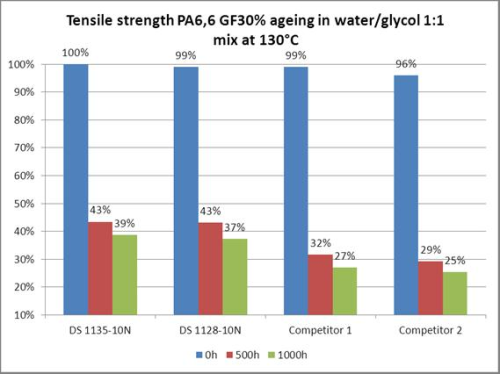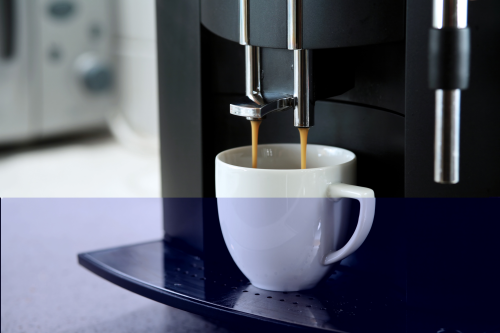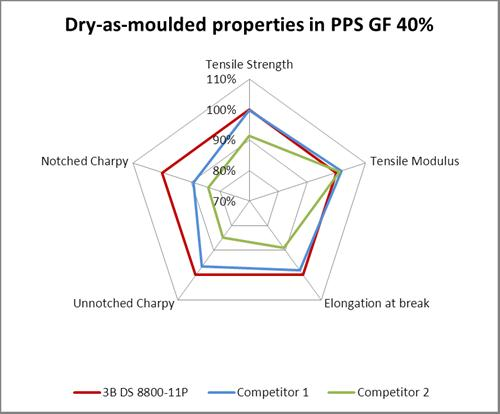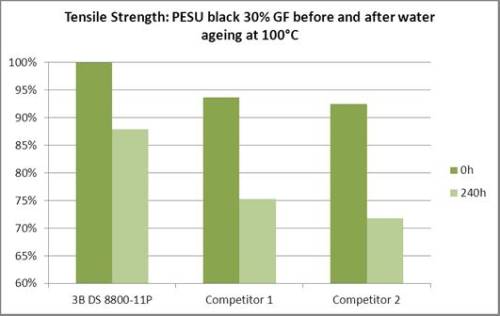



3B-the fibreglass company has introduced new glass fibre products with the aim of meeting food contact requirements for a wide variety of applications.
3B adds that DS 1135-10N is a new chopped strand food contact compliant product designed for general purpose polyamide applications. Due to a combination of hydrolytic properties associated to food contact compliance according to most recent norms, 3B says that DS 1135-10N will contribute to expanding the application of reinforced polyamide compounds to replace metal and other reinforced thermoplastics in a wide range of applications demanding good mechanical and ageing performance. Those applications range from automotive components to appliances. According to 3B, this new grade is designed to fit a broad range of polyamides (PA) such as PA6, PA66, PA610, PA6/66 copolymers and semi-aromatic PA. DS 1135-10N chopped strand is already available globally. Claudio Di Gregorio, 3B Product Leader Thermoplastics, said: “DS 1135-10N has been designed to meet the requirements of most common food and water contact certifications such as FDA, EC 10/2011 and relative amendments after the more restrictive applications apply at the end of 2015, BfR LII and ACS, this without making any compromise on the product performance side. “This new grade offers excellent dry-as-moulded properties, and grants very good performance level in heat-ageing and hydrolysis/glycolysis resistance. Furthermore its chemistry presents a good resistance to a wide spectrum of demoulding agents and an excellent compatibility with flame retardant and impact modifier additives. “All those characteristics make DS1135-10N a performing versatile PA reinforcement, so offering our customers an easier inventory management.” concluded Mr.Di Gregorio.
DS 1135-10N comes in a granulated form that grants superior feeding behaviour by reducing fine fibres. This translates into a higher productivity thanks to the reduced cleaning downtime and maintenance. This product has been designed in order to be suitable for pneumatic conveying and bulk transportation, making it an ideal choice for modern megacompounder lines, says 3B.
Short fibre reinforcements
3B is also enhancing its range of short fibre reinforcements for high temperature resins with the launch of DS 8800-11P. This new product has been designed to reinforce high temperature thermoplastics such as PES, PSU, PESU, PPS, PEI and PEEK, for example. 3B adds that in order to best leverage its properties in multiple applications including those in contact with aliments, DS 8800-11P has been designed to comply to the most recent food and potable water contact norms, similar to DS 1135-10N. DS 8800-11P is claimed to exhibit excellent mechanical properties, especially stiffness and heat stability. On top of dry-as-moulded properties, the new grade shows very good heat ageing and hydrolysis/glycolysis resistance.
The optimised dispersion behaviour of DS 8800-11P allows its usage in a wide range of resin viscosities, as well as at very high glass fibre loading (>55%).
A specific densification process allows for DS 8800-11P optimized bundle integrity and a bulk density that facilitate its handling. As a result 3B says that this product exhibits an excellent feeding behaviour with a very limited fuzz generation.
Claudio Di Gregorio added that the new product supports expansion of reinforced plastics usage in an ever stricter food contact market. “Indeed, the growing restrictions related to food contact norms add severe limits to the design freedom of glass fibre products. This normally results in a decrease of product performances associated with a higher cost and a product offering fragmentation. With its new DS 8800-11P for reinforcing high temperature thermoplastics, 3B-the fibreglass company has met the challenge to develop a performing yet cost-competitive product complying with the strictest food-contact norms.” In addition to food contact applications, 3B DS 8800-11P is designed for industrial applications including automotive (gears, bearing cages, thrust washers, etc.), mechanical engineering (rings, wheels, impellers, flow metre parts, pump components, etc.), and aerospace (gear parts, etc.)
This article will be published in the May/June 2014 issue of Reinforced Plastics magazine.
The digital edition of Reinforced Plastics is distributed free of charge to readers who meet our qualifying criteria. You can apply to receive your free copy by completing this short registration form.





